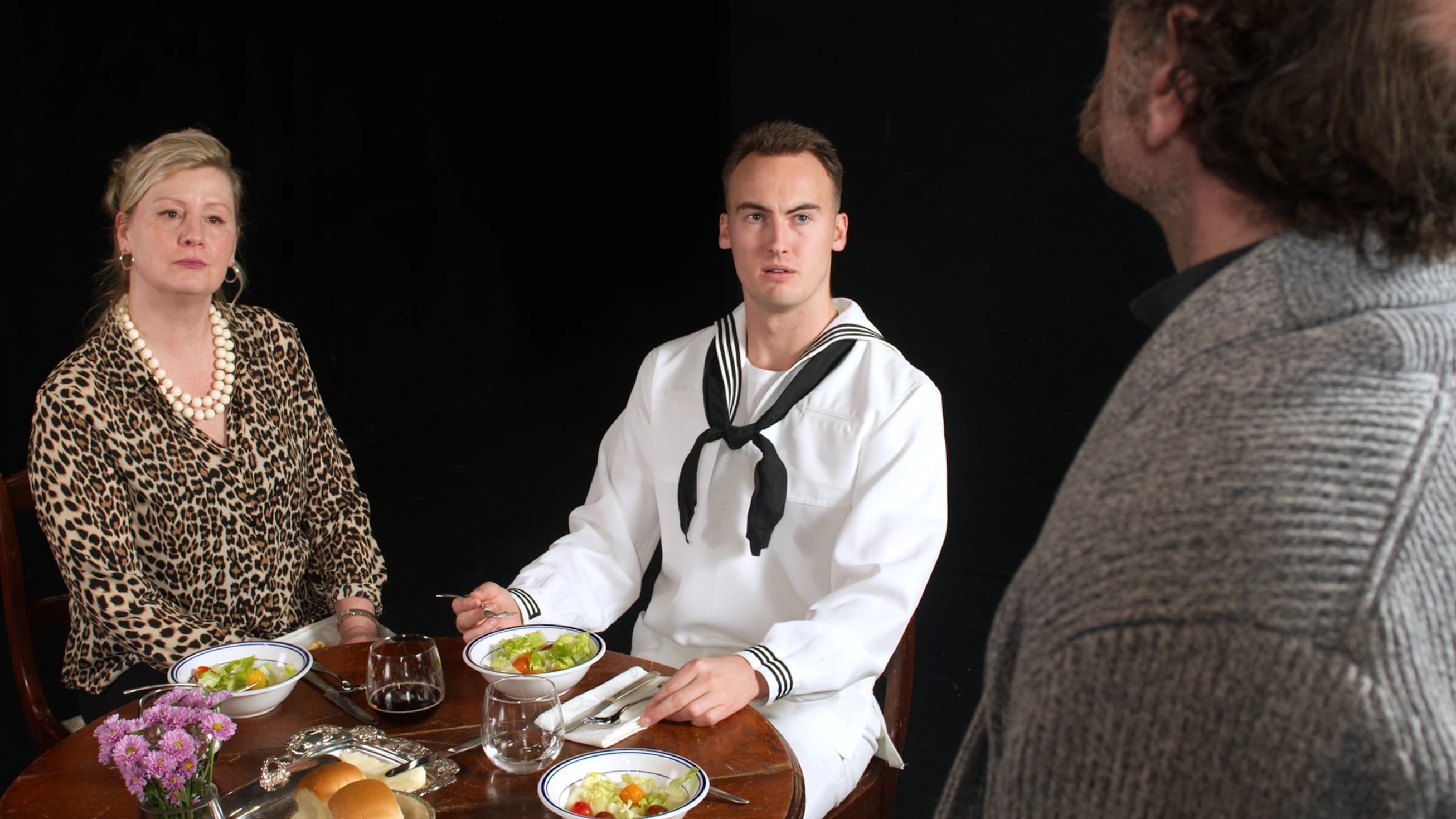Most playgoers snore at the prospect of performances that could be described as “nice,” “pleasant” or “appealing.” Yet as embodied by Rocco Weyer, star of 21ten Theatre’s production of Adopt a Sailor, those qualities become thorny and mesmerizing.
Weyer, who was haunting as the spurned hubby in Shaking the Tree’s production of Blood Wedding, has long been a lithe and lively presence on Portland stages. Adopt a Sailor should solidify his reputation by showcasing his portrayal of a seemingly straightforward military man who turns out to be a tangle of contradictions.
Written by Charles Evered, Adopt a Sailor was published in 2008, the year President George W. Bush appointed Gen. David Petraeus to lead U.S. war efforts in Iraq and Afghanistan. Geopolitics, however, are a distant concern in Evered’s play, which is preoccupied with domestic warfare in the most literal sense.
The warriors in question are Richard (Jeb Berrier) and Patricia (Brook Hogan), a middle-aged New York couple whose love/hate language is sniping. Richard backs his wife’s conviction that he’s a talentless pseudo intellectual—”I know what an idiot I am,” he confesses—but he’s still wounded by her disdain for his work as a filmmaker, which she mockingly characterizes as an endless pursuit of “the underbelly.”
Richard and Patricia are comically obvious candidates for couples counseling, but the play gives them the next best thing: a nameless sailor (Weyer) who knocks on their door, seeking a meal and a bed before he ships out to parts unknown yet tragically obvious.
Sporting a sword-smooth flattop and adopting a lyrical Arkansas drawl, Weyer looks and sounds the part. That matters. If the performances (and dialogue) were less authentic, the premise—purehearted Southern lad educates neurotic, self-sabotaging New Yorkers—could have descended into didactic parody.
Adopt a Sailor demands its cast can sell the idea that all overthinking intellectuals need an earnest soldier to remind them how silly their hangups are. What makes this production compelling is how Weyer, Berrier and Hogan pepper that questionable melody with eerie emotional staccatos that enrich the text.
In one scene, Richard interrogates the sailor, demanding that he admit that he’s more cynical and savvy than he appears. The sailor plays along, but Weyer adds a slight smile of amusement, suggesting the sailor is wise enough to know that it’s less trouble to agree than to reveal that he’s exactly what he appears to be: an idealistic young man who wants to serve his country.
The lack of a twist is a twist in itself, but Adopt a Sailor is neither game nor gimmick. 21ten has constructed a lived-in world—from the battered dining table to the beautifully aged burgundy carpet—that allows the actors to give performances so casually human that you feel as if you have parachuted into the middle of a home movie rather than a theatrical creation.
Adopt a Sailor is one of 21Ten’s BareBones productions, designed to be actor-centric and svelte. Consolidation serves the company’s ambition to tour the production, but it also reflects the play’s conviction that history is written not only on battlefields, but in homes where bonds are quietly forged, shattered and mended.
For all its rumpled intimacy, Adopt a Sailor carries a whiff of magical realism. The sailor’s account of surviving a fall out of a plane is so absurd that you wonder if he’s something more than mortal—perhaps a Clarence Oddbody for jaded couples, or even a charlatan who dons a sailor’s uniform as a means to enmesh himself in the lives of strangers.
I doubt that’s true—the point of the play is that every character is more or less who they claim to be—but it’s a testament to 21ten that Adopt a Sailor leaves you wondering whether you’ve witnessed a story complex in its simplicity or simple in its complexity. The play emulates the sailor’s directness, but it invites the audience to share in Richard’s hunger to be at once enlightened and confounded.
Most of the answers lie beyond the play’s one-hour running time, but there’s truth to be found in Adopt a Sailor. Just watch and listen as the sailor tells Patricia he’s going to marry a girl from his hometown named Emily, then admits that he has neither dated nor spoken to her.
“Kinda strange?” he asks. “No. Not at all,” Patricia replies. In those four words, Hogan conveys unease, understanding and motherly love. Patricia will never see this man again, but in that moment, she knows him—and so do we.
SEE IT: Adopt a Sailor plays at 21ten Theatre, 2110 SE 10th Ave., 503-208-5143, 21ten.org. 7:30 pm Thursday-Saturday and 2 pm Sunday, through March 24. $15-$20.
